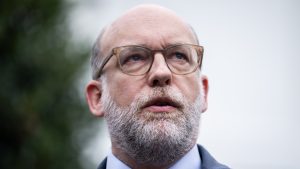Student loan ‘payment reversals’ make it harder for borrowers to repay debt

Gabrielle Perry borrowed $137,000 to earn her master’s degree in public health and become an epidemiologist. Her career of choice allowed her to secure a high-paying job in New Orleans, and she’s on track to pay off her student loans in less than two years.
That timeline is unusual. But the Trump Administration’s recent changes to student loan debt rules motivated her to speed up her repayment process. Earlier this year, Perry attempted to pay off a $20,000 student loan debt to her servicer, the Missouri Higher Education Loan Authority (MOHELA).
MOHELA only accepted $11,000.
What happened to Perry is called a payment reversal — a process in which money is returned to a customer’s bank account. It’s common with purchases from sites and services such as PayPal and Stripe. Typically, a payment reversal occurs when someone purchases an item that is no longer in stock, was charged more than once, or when a payment is reported as fraudulent.
In retail, it’s often a sign companies are doing their due diligence. For student loan borrowers, payment reversals can have negative consequences.

Tracking her payment reversal
Perry shared her experience on X (formerly Twitter), garnering interest online. When she posted that she was using money from her savings account to pay for her loans only to discover that MOHELA reversed her payment, fellow borrowers sympathized with her cause. Some X users even rallied behind Perry. On July 24, Perry confirmed that MOHELA finally accepted her payment.
“I was checking my bank accounts and saw that I have over $9,000 extra,” Perry told Straight Arrow News (SAN). “At first I assumed everything was fine, because it takes about five to six business days on average to process payments. But the extra money had been there for too long.”
Finding the source of the problem was time-consuming. Initially, she surmised that her credit union hadn’t released the funds as a protective measure. “So I contacted MOHELA and they had only accepted about $11,000 of the payment. Then they reversed the $9,000 payment twice,” Perry told SAN.
When SAN asked MOHELA to clarify what happened, the lending authority issued the following statement: “As a federal contractor for the Office of Federal Student Aid (FSA), MOHELA follows the directions and standards provided by the U.S. Department of Education, FSA.”

Thomas Gokey’s efforts and payment reversal story
Thomas Gokey is a co-founder and organizer with Debt Collective, an organization that advocates for better debt protections for student loan borrowers, people in medical debt and renters facing eviction.
But Gokey also has first-hand experience with student loan debt. He is one of more than 7 million Americans enrolled in the Saving on Valuable Education (SAVE) payment plan and in forbearance while the courts discuss the plan.
President Biden introduced SAVE in 2023 to decrease student loan debt payments. Part of the plan included loan forgiveness for low balances. The Biden Administration was sued in 2024, causing the program to wind up in courts. A federal injunction blocked parts of the plan in court.
As Aug. 1 neared, Gokey wanted to get ahead of any interest-related accruals coming his way. On July 31, he attempted to make a payment through his servicer, MOHELA.
Like Perry, his payment was reversed.
“I’ve tried to pay my interest multiple times and the payments have been reversed each time,” Gokey told SAN. “When I spoke to the MOHELA representative to ask why my payment got reversed, they said that according to their system, the payment was reversed for ‘various reasons.’”
The problem is not unique to MOHELA, said Gokey.
“I want to stress that this is across all servicers,” he told SAN. “This issue might involve one of those invisible vendors that handles the payments for all of the servicers.”
Those invisible vendors are likely payment service providers (PSP) working with MOHELA as well as other student loan debt servicers, Gokey said. A PSP is a third-party service that allows companies and individuals to accept online payments.

Data on payment reversals is still hard to find
It’s hard to determine how many people are facing reversal issues like Perry and Gokey. While the Federal Reserve keeps data on student loan delinquencies, which are rapidly increasing, there are no reports about payment reversals. But Gokey believes the payment reversals are a symptom of a larger problem: a breakdown in the system.
“Government and student loan servicer systems aren’t working and borrowers can’t make payments,” Gokey said. “Student loan payment issues aren’t just affecting people who are doing fine financially and want to pay debt off sooner. They’re affecting poor people who are trying to make $10 payments so they can stay current.”
Perry and Gokey’s current servicer, MOHELA, is one of the largest student loan servicers in the country. In 2024, MOHELA was cited for widespread failures. California student borrowers have also sued MOHELA for continuing to collect payments on student loan debt that was cancelled by the U.S. Dept. of Education.
MOHELA did not respond to SAN’s repeated requests for comment on this lawsuit.
Steps you can take if this happens to you
Perry suggests borrowers discuss student debt with a financial adviser. Though private services might be expensive, many banks have advisers on staff that will speak with existing customers without charge. She also stresses the importance of financial vigilance.
“I know so many people who just refuse to even log into their student loan debt accounts and see how much they owe, because the totality of that is so overwhelming to them that it almost makes them seize up,” Perry told SAN. “I used to be that way. You cannot be afraid of tackling your debt.”
Gokey also advises borrowers to seek help from experts and elected officials.
“Every member of Congress has a constituent services team. It’s this team’s job to help constituents who are having issues with a government agency,” Gokey said. “Every time you are having a problem with your student loans, contact your member of Congress. Make it their job to follow up with the Department of Education.”
The post Student loan ‘payment reversals’ make it harder for borrowers to repay debt appeared first on Straight Arrow News.





